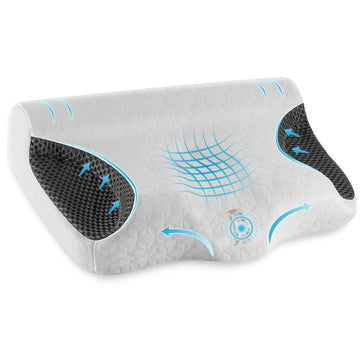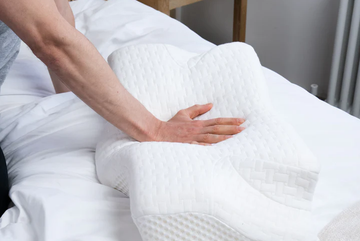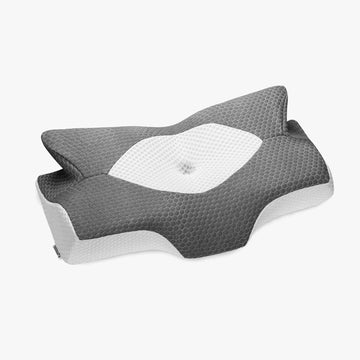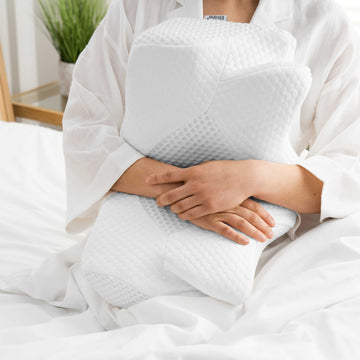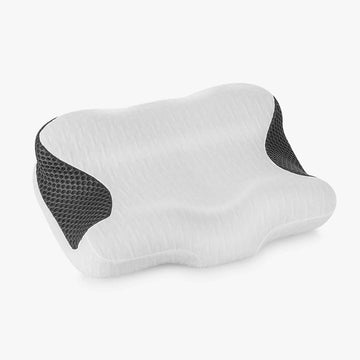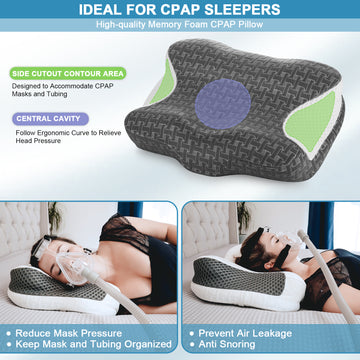For back sleepers, there are many advantages to using a memory foam pillow. These consist of:
A memory foam pillow can assist in reducing tossing and turning at night, and can improve the quality of sleep by giving the head and neck the right support.
Less pain and discomfort: By encouraging good spinal alignment, a memory foam pillow can assist in reducing neck and back problems.
Durable: Premium memory foam pillows are made to last and will continue to provide support and their shape over time.
Hypoallergenic: Memory foam is an excellent choice for anyone with allergies or asthma because it is inherently resistant to dust mites and other allergens.
It's critical to give a memory foam pillow enough time to adjust to the user's body before using it. It can take several nights to achieve this, as the pillow takes time to soften and mold to the user's silhouette.
There are additional steps that back sleepers may take, in addition to using a memory foam cushion, to encourage proper spine alignment and lower their chances of experiencing neck and back pain. These consist of:
Select a supportive mattress: Neck and back discomfort can also be caused by a mattress that is too soft or too hard. Look for a medium firm mattress that provides adequate support.
Gentle stretching can help calm the mind and body before bed by releasing tight muscles.
A memory foam pillow also mitigates snoring, an advantage for back sleepers. Poor sleeping position, which can cause airway obstruction, is one of many causes of snoring. A comfortable head and neck support from a memory foam cushion can aid in maintaining an open airway.
For back sleepers, maintaining a good sleep position is as critical as choosing the perfect pillow. This involves maintaining proper alignment of the head, neck, and spine, as well as avoiding sleeping on one's stomach, which puts undue strain on the neck and spine.
In conclusion, if you snore or have neck or back problems, a memory foam pillow made specifically for back sleepers can be a great investment. Make sure to consider firmness, shape, size, and material quality when choosing a pillow. Do not forget to sleep in an upright position by using a firm mattress and a pillow between your knees. By following these instructions, you can sleep better at night and wake up feeling rested and pain free.
A memory foam pillow can assist in reducing tossing and turning at night, and can improve the quality of sleep by giving the head and neck the right support.
Less pain and discomfort: By encouraging good spinal alignment, a memory foam pillow can assist in reducing neck and back problems.
Durable: Premium memory foam pillows are made to last and will continue to provide support and their shape over time.
Hypoallergenic: Memory foam is an excellent choice for anyone with allergies or asthma because it is inherently resistant to dust mites and other allergens.
It's critical to give a memory foam pillow enough time to adjust to the user's body before using it. It can take several nights to achieve this, as the pillow takes time to soften and mold to the user's silhouette.
There are additional steps that back sleepers may take, in addition to using a memory foam cushion, to encourage proper spine alignment and lower their chances of experiencing neck and back pain. These consist of:
Select a supportive mattress: Neck and back discomfort can also be caused by a mattress that is too soft or too hard. Look for a medium firm mattress that provides adequate support.
Gentle stretching can help calm the mind and body before bed by releasing tight muscles.
A memory foam pillow also mitigates snoring, an advantage for back sleepers. Poor sleeping position, which can cause airway obstruction, is one of many causes of snoring. A comfortable head and neck support from a memory foam cushion can aid in maintaining an open airway.
For back sleepers, maintaining a good sleep position is as critical as choosing the perfect pillow. This involves maintaining proper alignment of the head, neck, and spine, as well as avoiding sleeping on one's stomach, which puts undue strain on the neck and spine.
In conclusion, if you snore or have neck or back problems, a memory foam pillow made specifically for back sleepers can be a great investment. Make sure to consider firmness, shape, size, and material quality when choosing a pillow. Do not forget to sleep in an upright position by using a firm mattress and a pillow between your knees. By following these instructions, you can sleep better at night and wake up feeling rested and pain free.

